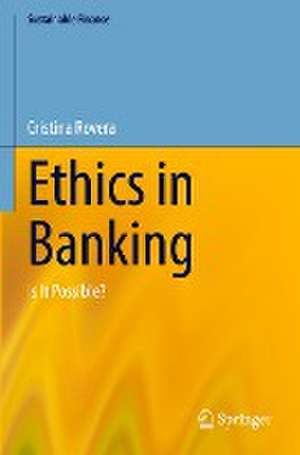Ethics in Banking: Is It Possible?: Sustainable Finance
Autor Cristina Rovera Contribuţii de Paul de Suryen Limba Engleză Paperback – 17 dec 2023
| Toate formatele și edițiile | Preț | Express |
|---|---|---|
| Paperback (1) | 776.09 lei 6-8 săpt. | |
| Springer Nature Switzerland – 17 dec 2023 | 776.09 lei 6-8 săpt. | |
| Hardback (1) | 782.10 lei 6-8 săpt. | |
| Springer Nature Switzerland – 17 dec 2022 | 782.10 lei 6-8 săpt. |
Din seria Sustainable Finance
- 20%
 Preț: 875.94 lei
Preț: 875.94 lei - 17%
 Preț: 395.20 lei
Preț: 395.20 lei - 17%
 Preț: 493.46 lei
Preț: 493.46 lei - 17%
 Preț: 393.97 lei
Preț: 393.97 lei - 17%
 Preț: 365.82 lei
Preț: 365.82 lei - 15%
 Preț: 592.44 lei
Preț: 592.44 lei -
 Preț: 401.42 lei
Preț: 401.42 lei - 18%
 Preț: 771.53 lei
Preț: 771.53 lei - 15%
 Preț: 588.18 lei
Preț: 588.18 lei -
 Preț: 377.57 lei
Preț: 377.57 lei - 18%
 Preț: 773.41 lei
Preț: 773.41 lei - 18%
 Preț: 1118.45 lei
Preț: 1118.45 lei - 15%
 Preț: 696.68 lei
Preț: 696.68 lei - 15%
 Preț: 699.93 lei
Preț: 699.93 lei - 15%
 Preț: 468.90 lei
Preț: 468.90 lei
Preț: 776.09 lei
Preț vechi: 946.45 lei
-18% Nou
Puncte Express: 1164
Preț estimativ în valută:
148.50€ • 154.75$ • 122.96£
148.50€ • 154.75$ • 122.96£
Carte tipărită la comandă
Livrare economică 03-17 aprilie
Preluare comenzi: 021 569.72.76
Specificații
ISBN-13: 9783031221507
ISBN-10: 3031221508
Pagini: 178
Ilustrații: IX, 178 p. 1 illus.
Dimensiuni: 155 x 235 mm
Greutate: 0.27 kg
Ediția:1st ed. 2022
Editura: Springer Nature Switzerland
Colecția Springer
Seria Sustainable Finance
Locul publicării:Cham, Switzerland
ISBN-10: 3031221508
Pagini: 178
Ilustrații: IX, 178 p. 1 illus.
Dimensiuni: 155 x 235 mm
Greutate: 0.27 kg
Ediția:1st ed. 2022
Editura: Springer Nature Switzerland
Colecția Springer
Seria Sustainable Finance
Locul publicării:Cham, Switzerland
Cuprins
Chapter 1. Introduction.- Chapter 2. Ethics in Finance: Definition.- Chapter 3. The ESG World.- Chapter 4. The Fight Against Money Laundering and Tax Evasion.- Chapter 5. The Fight Against Usury.- Chapter 6. Islamic Finance and Microcredit.- Chapter 7. The Rescue of Banks in Crisis.- Chapter 8. Financial Frauds; is Italy Different?.- Chapter 9. Conclusions.
Notă biografică
Cristina Rovera is Associate Professor in Banking and Finance at the University of Turin (Italy). Her research focuses on banking, investment strategies and financial management.
Textul de pe ultima copertă
Banks are frequently considered usurers. Is it possible to talk about ethics when you analyse banking activity? This book focuses on this question and starts with the history and the philosophy. Philosophers like Aristotle, Immanuel Kant and John Stuart Mill proposed different theories about the need for ethics in finance. If we accept Mill's thought, the production of wealth in society is driven by the personal pursuit of profit. But - unfortunately - this does not, on its own, ensure collective well-being. It must be guided by a superior mechanism which transforms it into wealth for all. This introduces the role of financial institutions, which often have to comply with legal obligations. The book focuses on the role that these institutions have in supporting the ‘ethical’ use of money. The author analyses a number of cases in banks and the financial industry and discusses topics like anti-money laundering, anti-usury, islamic finance, microcredit and bank rescue systems, including not only best practices but also examples of unethical financial management.
Caracteristici
Discusses cases on how financial transactions can be conducted in an ethical way Gives the historical and philosophical background for ethics in finance Analyses the role of financial institutions
